Teaching is Not for the Faint of Heart
Educators claim there's more to the job than just teaching; this is a first-hand peek inside the system.
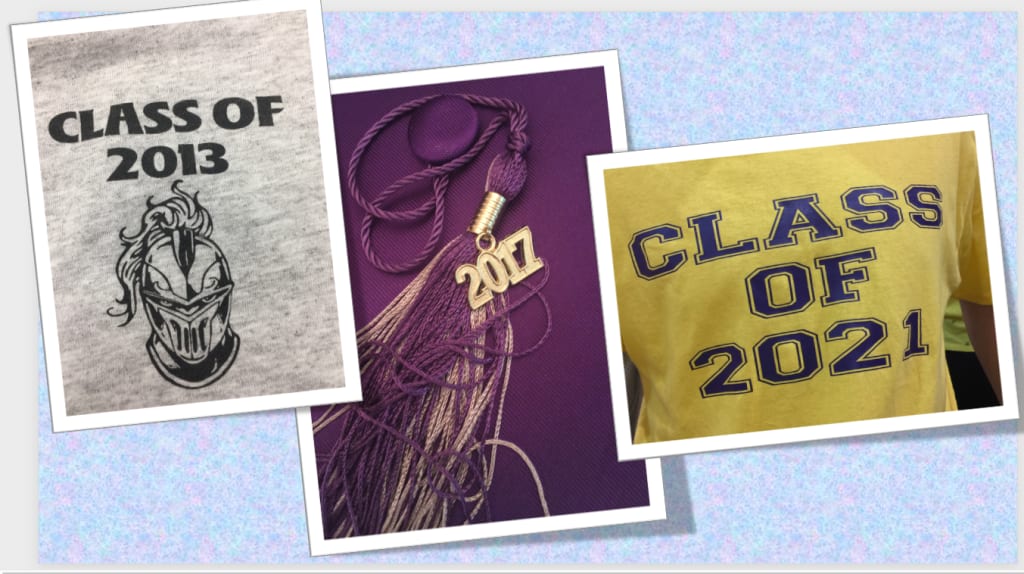
I loved my job because I made a difference.
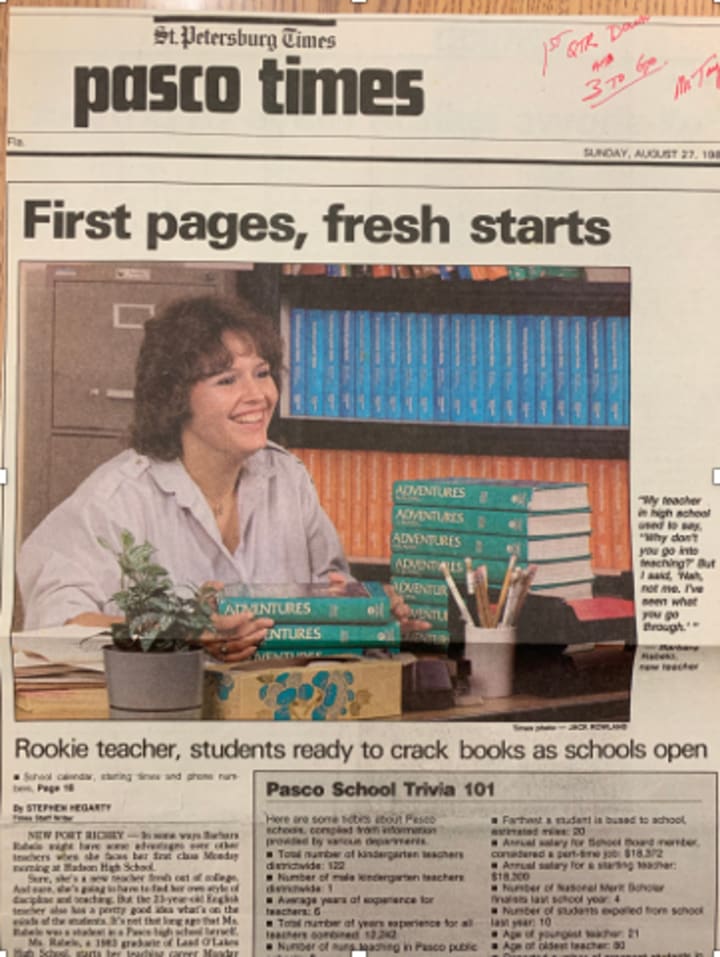
Past tense is necessary because I recently retired after 32 years of teaching in Florida. Once you’ve past the 10-year mark, teaching is in your blood forever. I feel the intense need to correct spelling and apostrophes on signs, and I’ve dangerously Shhhhh’d people at the movies. Retirement doesn’t mean my job is over; it’s simply morphing into different endeavors. Educators in the United States are both respected and maligned, depending on the issue, state, or even day of the week.
In Spring of 1985, I finally declared my major as English Education. The love of books and passion for writing had been my life so far so I felt going into the classroom wasn’t a far stretch. In January of 1986, I was taking a break in a friend’s dorm between classes when I heard the news on TV that the Challenger had exploded. Christa McAuliffe was going to be the first teacher in space, and her whole school was watching the historic event. At 73 seconds into the launch, something went horribly wrong, and those students witnessed their teacher and six others perish.
McAuliffe’s statement, “I touch the future; I teach,” became more inspirational for all of us in the College of Education. We saw this as a new vista, a new direction where we blazed trails for those behind us. We were going to change the world in that moment, and suddenly the world did change, just not in the ways we imagined. Many students from Concord High School went on to become educators as did McAuliffe’s own two children. More teachers-in-training spread all over the nation as young adults wanted to carry on her legacy.
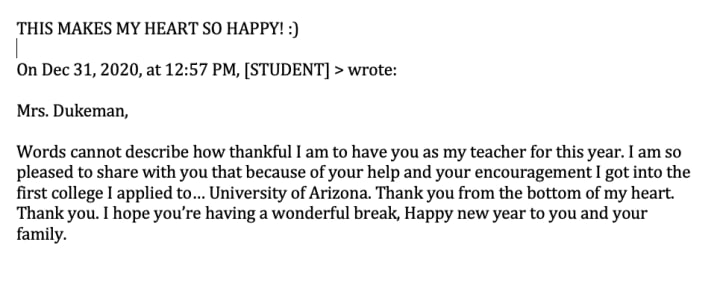
I taught a course required for graduation which meant students failing it wasn’t an option. From day one of the school year, I could spot the ones who hated English and didn’t try to hide it. If I could make them “not hate it so much,” I would chalk that up in the win column. Their pride in “never reading a whole book” was about to be turned upside down. As teachers, we were inspired by movies like “Dead Poets’ Society,” “Stand and Deliver,” “Conrack,” and “To Sir with Love.” There would be different ways to reach and touch the lives of these students, and we were determined to be the ones to do that.
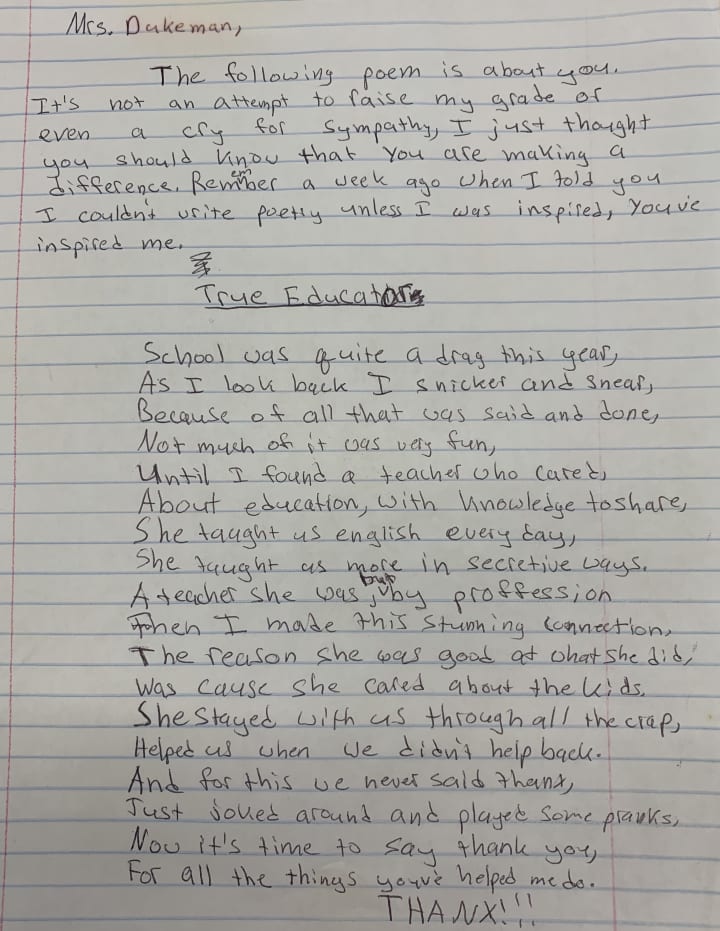
The first time I felt the force in our role as educators was with a freshman student. Two teachers were in the classroom; I was content area specialist, and my co-teacher worked with special education students in the same class. She was also brand new to teaching. One day she pointed out a student with bruises on his arm and asked me what to do. I advised her to ask him first; boys rough house all the time, they get injured in sports, etc. When asked, the boy said his father grabbed him and hit him-it was an everyday occurrence. That triggered the phone call we all dreaded to make. All school personnel are mandated reporters.
During lunch, I walked her through the process of calling the abuse hotline required by the state. She reported the incident, and then I had her contact the guidance counselor and assistant principal in charge of that grade to let them know the call had been made. We had discharged our duty to protect the student.
However, things did not go the way we expected. He came back the next day with more bruises. After the Child Protective Services had come out to their house to investigate, the father hit him again for saying anything to us in the first place. My co-teacher was absolutely devastated; she felt she was responsible. During break, I watched her lean against a wall and crumble down to the floor, crying. I convinced her that no, she was not responsible. The student still lived with the monster, and that was the cause. I had her call again even though she begged not to call. This time it was a success; the father was arrested and restraining orders would be put in place down the line. She finally understood the importance of making that call. The help wasn’t immediate; it took two days.
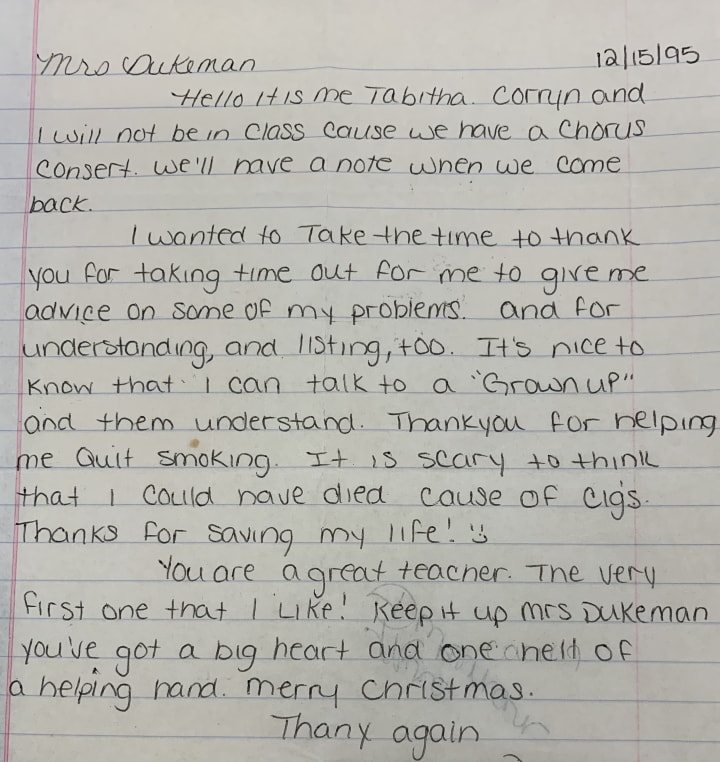
One would think that education is the top focus in school; it is not. It is second to safety. This includes emotional safety as well. I have seen a marked increase in anxiety and depression among students throughout most of my career. The shooting at Columbine in 1999 is the reason that all schools and businesses now have crisis flip charts. It shook students and teachers to the core; students that were just like them had their lives taken from them. They began to understand that they were not as invincible as they thought, and sometimes the evil was in the school among them.
Columbine, Sandy Hook, Virginia Tech, Parkland. The freshmen at Marjorie Stoneman Douglas High School during the shootings were now seniors at the height of the pandemic. The Sandy Hook Promise organization created a back-to-school video to remind everyone that threats are still out there, still tangible, still possible. After the Parkland shooting, our state legislature passed a law that forced districts to create more effective methods to handle emergencies. Schools in my county were instructed on Active Threat Protocol (ATP) which served as a model for other districts. These actions were much different from the lockdowns of yesteryear; these scared students and teachers alike. Teachers had to be reassured that whatever decision they made for the safety of their students would be respected since every situation would be different. The drills they conducted were often without warning, and we had to make decisions in split seconds. That remains a heavy weight on teachers’ shoulders.
This was just the beginning of a cascade of mental health issues. Prior to the Covid lockdown, teachers were required to attend monthly social emotional health trainings for both themselves and the students beginning in fall of 2019. We were learning how to spot issues, what resources were available on campus, and how to mitigate breakdowns. Cue the pandemic.
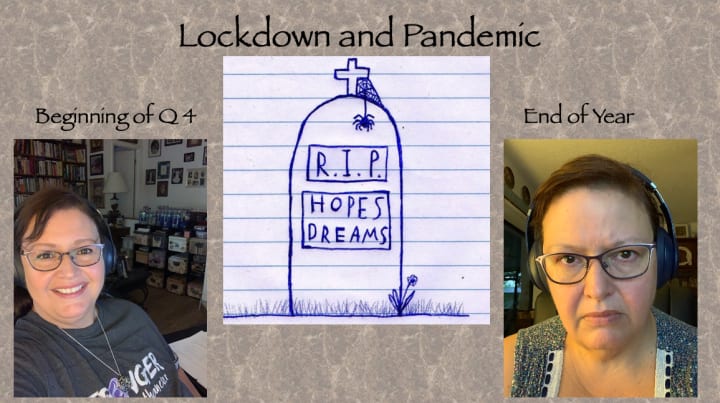
After spring break of 2020, we were all locked down, and online education via Zoom and Florida Virtual School was the only option. All of us were caught off guard, but we managed to muster through to the end of the year. Graduations that were once dreamed of and celebrated were delayed and reduced to partial outdoor venues with distancing, masks, and two guests. Then came the question of the 2020-2021 school year. How was that going to look?
Different. Much different. All school personnel and students had to wear masks. We supplied our own plastic partitions on our desks if we wanted one. Teachers had to wipe down the students’ desks with a special disinfectant after each class (for me that was 30 desks x 5 classes). Classes were dismissed on a staggered schedule to reduce mixing and crowds. Lunches were held in classrooms away from the cafeteria. Contact tracing was vigorously followed as we had to supply our seating charts on a regular basis. Hybrid instruction was the norm with students who chose to stay home on Zoom at the same time we had physical students in attendance. We looked at the green dot on the laptop and the masked faces in our classes at the same time. Anxiety rose to unprecedented levels in both students and teachers, but we were all in it together, supporting each other.
Because of the pandemic, I believe many of our future classes are going to have many broken children. As elementary school students, their minds aren’t mature enough to understand why things happened the way they did; only that they were sent home for two weeks at a time throughout the year or reprimanded for not wearing a mask properly. The ability to gather in groups now is still anxiety-ridden. Schools and teachers are still working at making the classroom and school a safe place, but they are all still afraid of the unknown.
They are afraid of many things, and sometimes they don’t know what to do. Suicides have increased by 60% according to an article in USA Today (Sept 11, 2020). Part of the social emotional training teachers have been learning and then sharing with students includes a video presentation on suicide. It’s a painful subject to address among angsty teenagers, especially by teachers who are not trained counselors.
On one Friday after teaching the suicide awareness module, a young man asked to see me after class. I had my planning period at the end of the day, and I said sure. He related to me his thoughts of suicide. Red flags popped up all inside my head. Then he said he had tried to do it that week but was interrupted when his father came home early that day. He was quite detailed with what he had planned to do.
This was way beyond 1-800-96-ABUSE. We took a walk down to the front office together, and I snagged my assistant principle (AP) along the way and insisted he walk with us. Once we reached the AP’s office, I repeated what the student reported. Further questions were asked. Phone calls were made. Counselors showed up. Finally, the School Resource Officer (SRO) showed up. Based on the student’s answers to a set of questions, it was determined he was a danger to himself, and the SRO would take him to a nearby crisis counseling center for the next 72 hours. Since he was 18, no parental permission was needed. It turned out to be five days, but he came back a changed man. Two months later at graduation, he proudly crossed the stage. As that class sponsor, I was also on stage that year. He walked by me, fist-bumped me, and whispered, “You saved my life.”
That was not the first time I heard that phrase. During one Teacher Appreciation Week (first full week of May) four years ago, a senior wrote me a letter. In it she said, “You had on your bucket list that you wanted to save a life. Well, you saved mine.” A realistic bucket list was my last assignment before students headed into final exams and presentations; it accompanied the reading of “Do Not Go Gentle into That Good Night” by Dylan Thomas. They had to create list of at least 15 items that would take a weekend, a month, a year, and a lifetime to complete. It was a sneaky way of getting them to set goals and look toward the future. I prefaced that assignment by reading my own bucket list to get them started. She remembered my list.
She wrote, “I came from [a different] high school at the beginning of the year after a mental breakdown. They told me I wouldn’t graduate even though I was eligible to be valedictorian. When I switched schools, you welcomed me, listened to me, let me sit in your room during lunch, let me cry, and sometimes fed me. I can’t recall the number of times over the summer I wanted to end it all, but I didn’t. You made me feel valuable again. Coming here was the best thing I’ve ever done. The teachers here care. You believed in me, and I’m going to make it.”
When you get a letter with this in it, you can’t help but reflect on the purpose of your life, the impact of your career choice. I taught English, graded more essays than stars in the sky, sometimes fed them and provided Bob’s Sweet Stripes, gave them supplies, sometimes money, started a GoFundMe for student who needed a computer battery, provided clothing, reassured them, encouraged them, edited their college application essays, helped them make good decisions, and on occasion, saved lives. It’s true this state does not compensate their teachers well. So, what do we make? According to Taylor Mali, a teacher and spoken word poet, “Here, let me break it down for you, so you know what I say is true:/Teachers make a goddamn difference! Now what about you?”
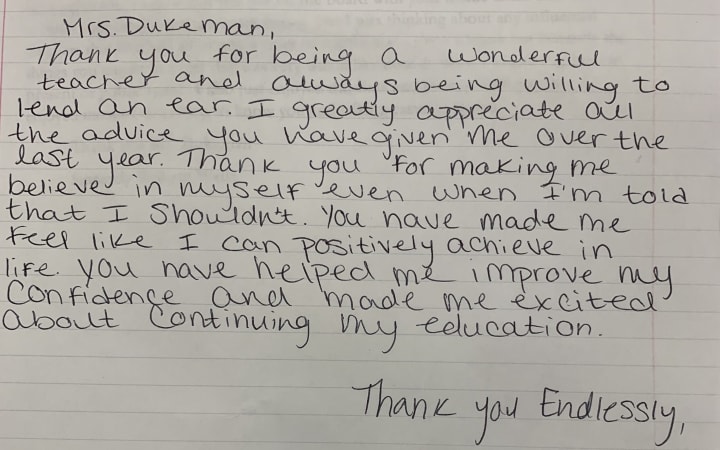
My teaching experience started with the Challenger and ended with the International Space Station. Our school was one of four in the nation chosen to speak with the astronauts as they zoomed overhead for a short window of 15 minutes. We had news media there, the ham radio operator, the video operator, and a line of students with pre-approved questions to ask the astronauts (who knew the questions in advance to make the best use of time). I was lucky to have an intern, giving me a chance to slip out of class and join the event in our theater. The auditorium filled with over 900 students was preternaturally quiet. Listening to the radio operator calling the station, over and over, gave me goosebumps. We then heard the crackly response as the space station came into the perfect position. I was there, watching in utter amazement the astronauts on the space station and listening to students asking insightful questions. This is what it was supposed to be like with the Challenger. I realized my career was reaching its end; I concluded that space may or may not be our final frontier, but the next generations we teach will lead the way into the future.
NOTE: I mentioned earlier my role as an educator is shifting, not ending. I told my kiddos every year that my job as their teacher doesn’t end at graduation. I’m still writing letters of recommendation for students and teachers, editing college essays, providing resources, assisting my interns, and helping my teacher friends when they get into a pickle. I told my English department I promise to ferret out plagiarism if they send me an essay with questionable authorship. For those students who were brave enough to friend me on Face Book, I comment on their posts, congratulate them, encourage them, commiserate with them, and continue to be the Dukeman they remember from high school.
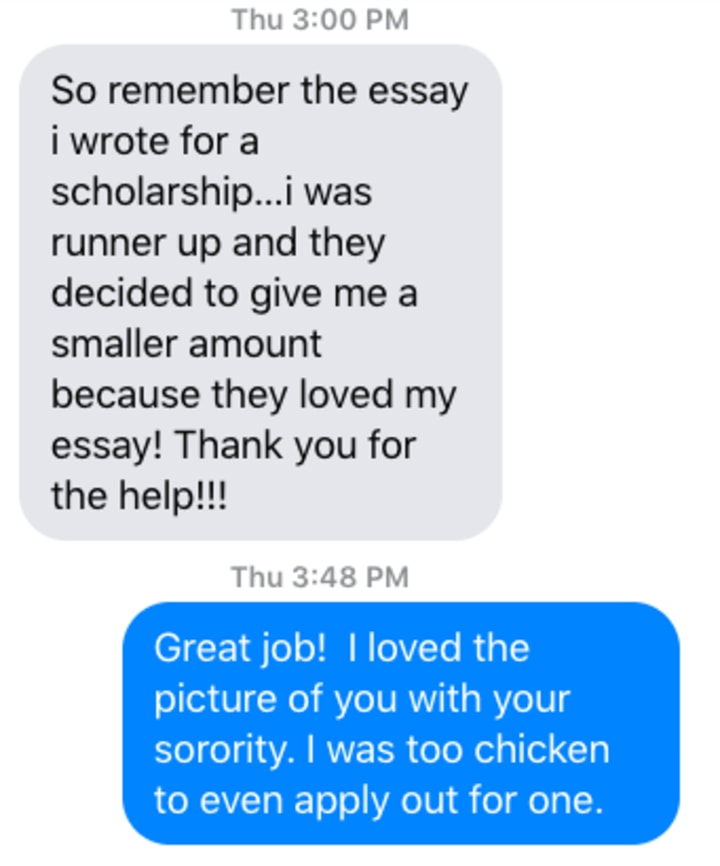
About the Creator
Barb Dukeman
After 32 years of teaching high school English, I've started writing again and loving every minute of it. I enjoy bringing ideas to life and the concept of leaving behind a legacy.







Comments (1)
Incredible life you've lived. I wanted to be an English teacher. In grade school and high school, that's the only career I ever considered. Then one day my English teacher-mentor-favorite person made me swear to her that I would not, under any circumstances, become a teacher. I swore. I did not get a degree in Education and my life has taken a million unanticipated turns. But I can imagine going through every experience you've so beautifully described as if that had been akin to my life. Thank you. Several parts brought tears. Thank you.